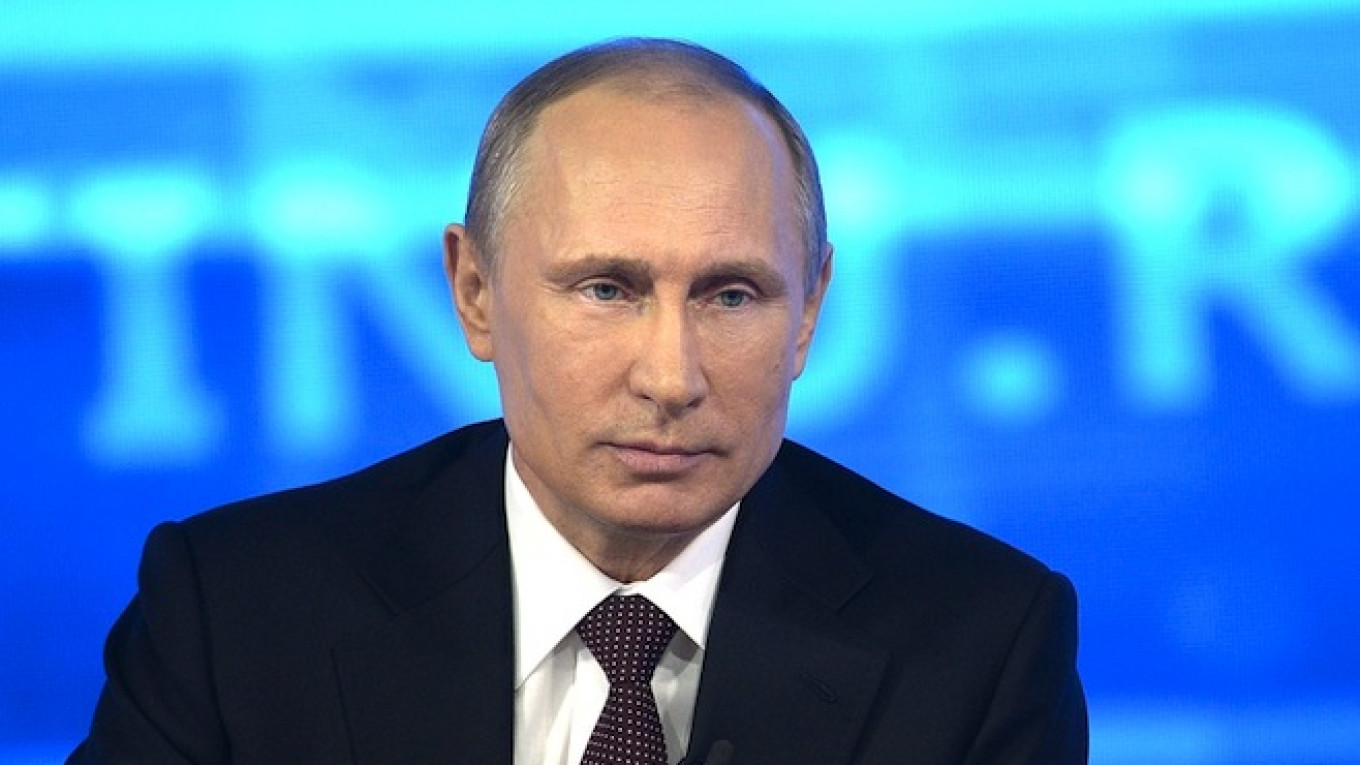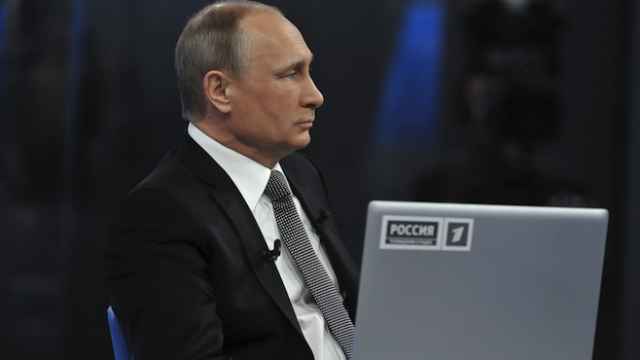President Vladimir Putin said Thursday that Russia's economy could return to growth in less than two years, despite Western sanctions which he said were intended to "contain" his country.
In a confident performance during a televised call-in show, Putin sounded defiant and patriotic, assuring viewers that Russia will survive an economic crisis deepened by the sanctions and low oil prices, and will always stand up to the West.
But he offered no new ideas or policies as he took questions on subjects ranging from the planned delivery of air defense systems to Iran and the crisis in Ukraine that prompted the sanctions, to the price of milk.
One woman even enlisted his help in persuading her friend's husband to let her have a dog for her birthday, underlining the all-powerful image Putin enjoys among many Russians.
The former KGB officer, in power for 15 years, made clear he mainly blames the West for Russia's economic problems, including the weak ruble, high inflation and falling revenues.
Asked if he stood by a prediction that the economy can return to growth in two years, Putin said: "With what we are seeing now, the strengthening of the ruble and the growth in the markets … I think that it may happen faster … but somewhere in the region of two years."
The ruble plunged 40 percent last year against the dollar but has strengthened in recent weeks, tracking the price of oil but also buoyed by a cease-fire in Ukraine.
Although the Central Bank expects the economy to contract by 3.5 to 4 percent this year and by 1 to 1.6 percent in 2016, the 62-year-old leader said anti-crisis measures were on the right track and the economy and people had proved resilient.
The government's moves include 10 percent budget cuts in most areas of spending, but Putin said he would try not to inflict too much pain on the population.
"To carry out a competent economic policy you have to use your head, of course, but if we want the people to trust us, we also have to have a heart. And we have to feel how the ordinary person lives," he said.
"Western Containment"
Sitting at a desk in a television studio in front of rows of telephone operators taking calls from viewers, Putin, wearing a suit and tie, said the sanctions were politically motivated by Western powers which he accused of wanting to "contain" Russia.
"I think they do not relate directly to events in Ukraine," he said, adding the sanctions had remained in place even though Russia believed Kiev was to blame for the failure to implement a cease-fire deal fully in east Ukraine.
He said he had recently discussed the sanctions with Russian business leaders: "I told them we can hardly expect sanctions to be lifted now because they are purely political."
Putin's ratings in Russia have soared since the country annexed the Crimea peninsula from Ukraine just over a year ago but relations with the West are at their lowest point since the Cold War ended nearly a quarter of a century ago.
Western leaders say they have overwhelming evidence that Moscow has provided pro-Russian separatists fighting Ukrainian government forces in east Ukraine with soldiers and weapons.
Putin again denied this and defended a decision this week to lift a self-imposed ban on the delivery of the advanced S-300 missile defense system to Iran following an interim deal at talks on Tehran's disputed nuclear program.
He said, however, that Russia would work "as one" with its partners at the United Nations — signaling Moscow will not violate sanctions still in place on Iran — and that the S-300 deliveries would be a deterrent to violence in the Middle East.
He reiterated criticism of the United States by attacking superpowers which "consider themselves the only centers of power," but said Russia was ready to cooperate with any nation that treated it with respect and as an equal.
Putin, 62, has held a call-in almost every year since he was first elected president in 2000, answering questions on issues from local housing problems to international conflicts.
They have often been marathon performances, the longest lasting 4 hours 47 minutes in 2013, and been used by Putin to show he is in command and ready to address the people's problems, large or small.
In the first two hours of questions on Thursday, he was not asked about his disappearance from public view for 10 days last month, which prompted speculation about his health.
A Message from The Moscow Times:
Dear readers,
We are facing unprecedented challenges. Russia's Prosecutor General's Office has designated The Moscow Times as an "undesirable" organization, criminalizing our work and putting our staff at risk of prosecution. This follows our earlier unjust labeling as a "foreign agent."
These actions are direct attempts to silence independent journalism in Russia. The authorities claim our work "discredits the decisions of the Russian leadership." We see things differently: we strive to provide accurate, unbiased reporting on Russia.
We, the journalists of The Moscow Times, refuse to be silenced. But to continue our work, we need your help.
Your support, no matter how small, makes a world of difference. If you can, please support us monthly starting from just $2. It's quick to set up, and every contribution makes a significant impact.
By supporting The Moscow Times, you're defending open, independent journalism in the face of repression. Thank you for standing with us.
Remind me later.






